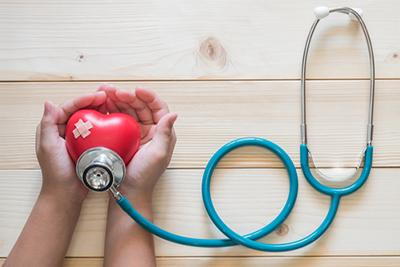Heat-Related Illnesses: Signs, Symptoms, and Prevention

- posted: Jul. 20, 2024
Exposure to excessive or prolonged heat and humidity without adequate relief or proper fluid intake can lead to various types of heat-related illnesses. According to Primary Care Partners of New Jersey, pediatric and medical professionals serving New Jersey, sweating acts as one of the body's cooling mechanisms. However, children and teens, in particular, often do not think to rest while enjoying themselves, so they may not drink sufficient fluids while engaging in sports or other exercises/activities.
Types Of Heat-Related Illnesses
There are three types of illness related to excessive heat -
Heat Cramps
- Symptoms include painful cramps and flushed skin.
Heat cramps refer to the most mild form of heat illness. They are characterized by painful muscle spasms/cramps that occur during or after intense exercise or profuse sweating in high heat.
Heat Exhaustion
- Symptoms include muscle cramps, moist skin, fever, vomiting/nausea, headache, fatigue, and feeling faint.
Heat exhaustion, which is recognized to be more severe than heat cramps, occurs due to the loss of water and salt in the body. It occurs when the body fails to cool itself properly and typically occurs in extreme heat, and when excessive sweating occurs without adequate fluid and salt replacement. If not addressed, it can escalate into heat stroke.
Heat Stroke
- Symptoms include warm, dry skin, rapid heart rate, vomiting/nausea, headache, fatigue, confusion, agitation, seizures/coma – potential death.
Heat stroke refers to the most severe form of heat illness. It occurs when your body's heat-regulating system becomes overwhelmed by extreme heat. This condition is a life-threatening emergency that demands immediate medical attention.
Preventing Heat-related Illnesses
Consider this guidance that will help avoid heat-related illnesses –
- On hot days, it is essential to drink plenty of fluids during vigorous outdoor activities (including sunbathing).
- Focus on water and sports drinks or drinks with added electrolytes.
- Avoid alcohol, caffeine, tea, coffee, and cola; these fluids can dehydrate you, especially in high heat or humid conditions.
- Choose light-colored, lightweight, loose-fitting clothing on extreme weather days.
- Schedule vigorous activity for the naturally cooler times of the day.
- Take frequent drink breaks, rest often, and do so as needed in shady areas.
- Wears a hat, sunglasses, and sunscreen as added protection.
- Mist with a spray bottle routinely to avoid becoming overheated.
- Warm up and cool down before and after exercising.
Contact a Leading New Jersey Pediatrician Near You Today
Children and teenagers with chronic health conditions or those taking specific medications may be more vulnerable to heat-related illnesses. For more information, contact a staff member of Primary Care Partners of New Jersey today.

- posted: Jul. 20, 2024
Exposure to excessive or prolonged heat and humidity without adequate relief or proper fluid intake can lead to various types of heat-related illnesses. According to Primary Care Partners of New Jersey, pediatric and medical professionals serving New Jersey, sweating acts as one of the body's cooling mechanisms. However, children and teens, in particular, often do not think to rest while enjoying themselves, so they may not drink sufficient fluids while engaging in sports or other exercises/activities.
Types Of Heat-Related Illnesses
There are three types of illness related to excessive heat -
Heat Cramps
- Symptoms include painful cramps and flushed skin.
Heat cramps refer to the most mild form of heat illness. They are characterized by painful muscle spasms/cramps that occur during or after intense exercise or profuse sweating in high heat.
Heat Exhaustion
- Symptoms include muscle cramps, moist skin, fever, vomiting/nausea, headache, fatigue, and feeling faint.
Heat exhaustion, which is recognized to be more severe than heat cramps, occurs due to the loss of water and salt in the body. It occurs when the body fails to cool itself properly and typically occurs in extreme heat, and when excessive sweating occurs without adequate fluid and salt replacement. If not addressed, it can escalate into heat stroke.
Heat Stroke
- Symptoms include warm, dry skin, rapid heart rate, vomiting/nausea, headache, fatigue, confusion, agitation, seizures/coma – potential death.
Heat stroke refers to the most severe form of heat illness. It occurs when your body's heat-regulating system becomes overwhelmed by extreme heat. This condition is a life-threatening emergency that demands immediate medical attention.
Preventing Heat-related Illnesses
Consider this guidance that will help avoid heat-related illnesses –
- On hot days, it is essential to drink plenty of fluids during vigorous outdoor activities (including sunbathing).
- Focus on water and sports drinks or drinks with added electrolytes.
- Avoid alcohol, caffeine, tea, coffee, and cola; these fluids can dehydrate you, especially in high heat or humid conditions.
- Choose light-colored, lightweight, loose-fitting clothing on extreme weather days.
- Schedule vigorous activity for the naturally cooler times of the day.
- Take frequent drink breaks, rest often, and do so as needed in shady areas.
- Wears a hat, sunglasses, and sunscreen as added protection.
- Mist with a spray bottle routinely to avoid becoming overheated.
- Warm up and cool down before and after exercising.
Contact a Leading New Jersey Pediatrician Near You Today
Children and teenagers with chronic health conditions or those taking specific medications may be more vulnerable to heat-related illnesses. For more information, contact a staff member of Primary Care Partners of New Jersey today.
